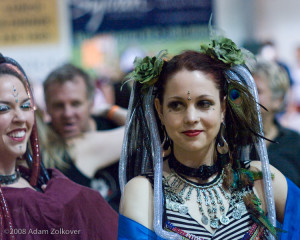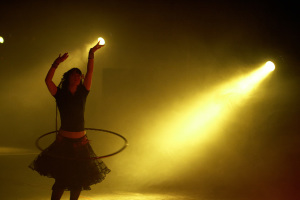
Me, during grad school, performing at the local roller derby, with my fantastic troupemates at the time.
I had a couple of rough patches in grad school.
There were a few semesters during which I was in a relationship that’d gone bad, and a living situation that’d gone bad, and my coursework wasn’t doing so great either. I’d hold my act together during the week, and once a day on weekends, drive to dance practice, where I would sit, clutching a coffee mug, sobbing, until it was time to dance.
I’m naturally prone to anxiety, and in certain circumstances that can develop into depression. This chunk of grad school was one of those times, and aside from being in and out of therapy, I wasn’t sure what would help. Dance did.
Aside from the physiological benefits of exercise, which help reduce stress and all that, I found in dancing a solace that ushered me through that difficult time. Simply knowing that I would spend a few hours with people who cared about me (the sentiment went both ways) went a long way toward helping my mental and emotional health. The creative and expressive aspects of the dance certainly helped, too; I could utilize muscle isolations and arm undulations and spins and turns to dance out what I was feeling, to emote and in turn process my emotions.
Being able to spend time with the group of women in that dance troupe, doing the strange but fun dancing we favored, did tons for my mental health. And I don’t know that it would’ve been the same if I’d done another style of dance.
If I’d been doing ballet, the body image issues that’ve plagued me my whole life probably would’ve been prominent enough to pile onto my existing problems (yes, I feel good about my body now, but you try growing up in Los Angeles as a girl with some curves and see how you do). I don’t know that modern dance would’ve offered the cohesiveness of style that drew me to belly dance, and kept me interested for half my life. And so on with the other dance styles that are out there – none of them speak to me, resonate with me, as much as belly dance does. The main style I do, American Tribal Style®, focuses on group improvisation and is intellectually fascinating as well as creatively engaging. How could I not love it?
To borrow a concept, Mihály Csíkszentmihályi explains the concept of the flow state as that perfect balance of being competent and being challenged at a given task. You’re not bored, but you’re also not frustrated. Due to what makes me “me” as well as inherent aspects of the dance itself, belly dance has been able to help me transcend into a flow state for the better part of a decade. And when you’re in a flow state (or when I am, at least), I know that I am blissfully, mindlessly absorbed in that given activity. Minutes or hours spent in that carefree state can make me feel ecstatic, perfect, loved, wonderful, wondrous.
My depression during that time was bad; it could’ve been worse, but it was bad. Having access to this particular dance, and this particular dance community, improved my life immeasurably. I’m not sure what I would’ve done without it.
Saying that belly dance saved my life might sound hyperbolic, but that’s how it felt at the time. I wouldn’t be the same person I am today without belly dancing. And I’m okay with that – it’s been an undoubtedly positive influence in my life where other influences (relationships, academia, anxiety) have been ambivalent if not outright toxic. As such, I’m glad that I get to teach it, perform it, and immerse myself in it.
So, shout-out to the ladies of Different Drummer Belly Dancers who were my troupemates then, and the wonderful women of Indy Tribal, who are my troupemates now. My life is richer because of you all.

